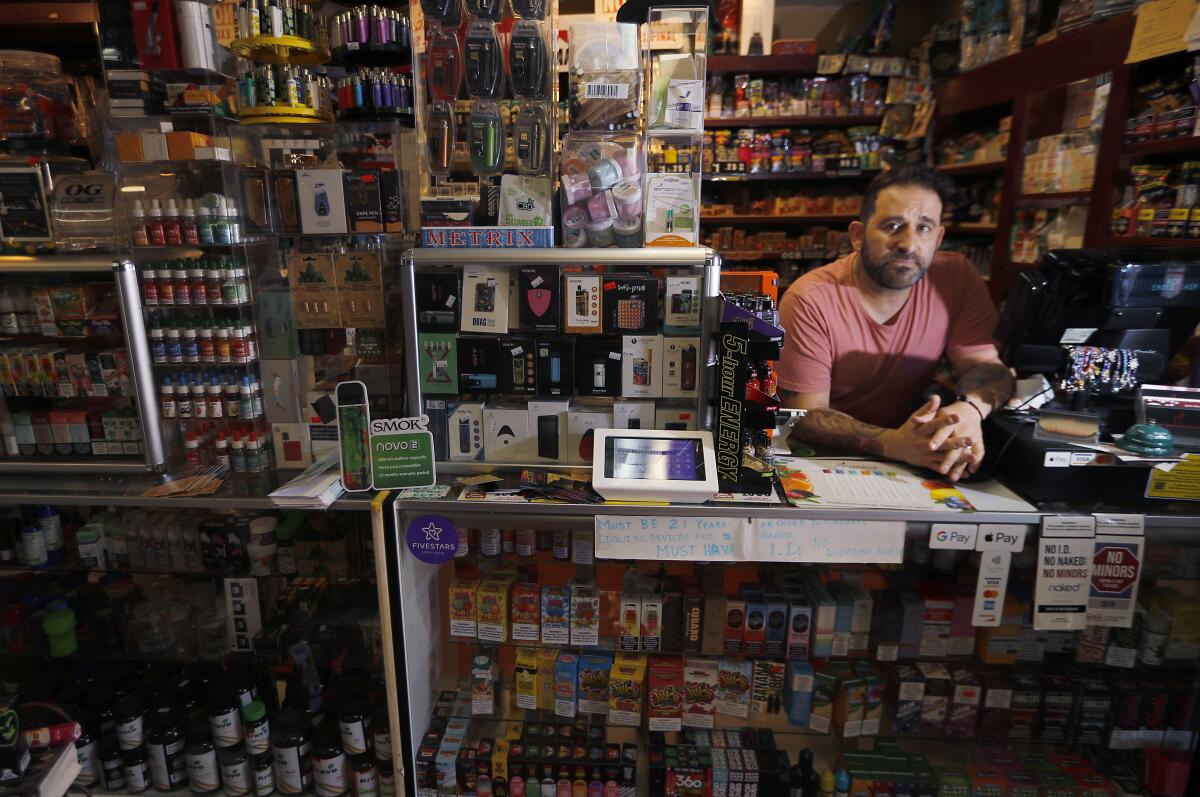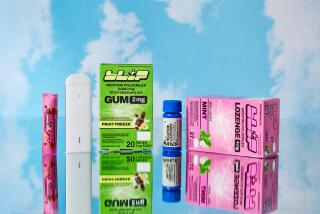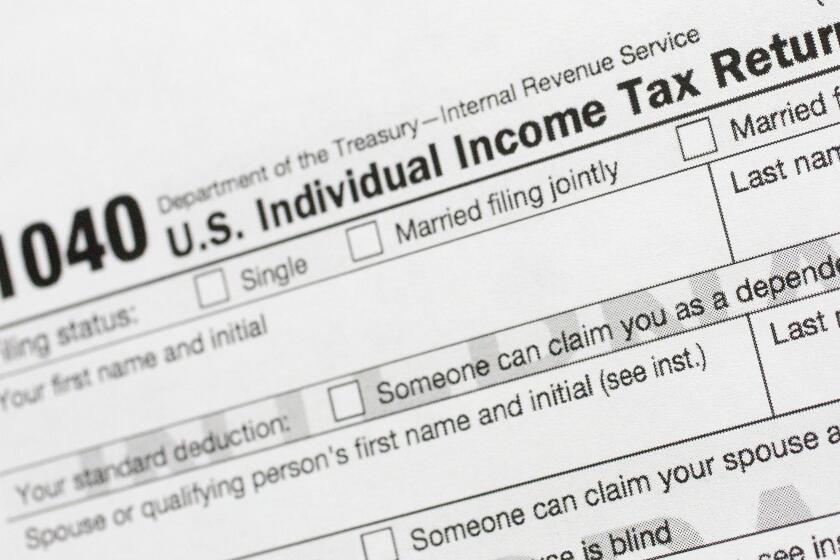The L.A. vape shop scene was booming. Those days are over

The Ace Smoke Shop on a gentrifying strip of Lake Avenue in Altadena is a small business in every sense of the word — a tiny shack crammed with a variety of tobacco products that attracts a steady stream of customers in need of their nicotine fix.
Local residents and workers stop in and grab a pack of Marlboros or a cigarillo, but what largely draws them these days is the bewildering array of e-liquids in flavors such as butterscotch, kiwi-strawberry, vanilla bean and variety of tropical fruits, as well as no-muss, no-fuss disposable e-cigarettes in mango and other varieties.
It wasn’t always this way. When the current owners took over the shop seven years ago, it was stocked with cigarettes and other traditional smoke shop items, but over the last several years as vaping has exploded in popularity the mix of inventory has changed accordingly.
Now, Jacob Grair, who owns the shop with his cousin, wonders if he can even stay in business.
Last week, the Los Angeles County Board of Supervisors approved an ordinance that will ban the sale of all flavored tobacco products in Altadena and other unincorporated communities — the latest in a flurry of laws passed in response to a sharp rise in teen vaping, as well as a mysterious and severe pulmonary disease that as of Thursday had sickened more than 1,000 people and killed at least 18 nationwide, including two in California.
Health officials suspect tainted vaping liquid containing THC, the psychoactive ingredient in marijuana, sold on the black market — not legal vape shops — may be at the root of the health crisis. But no single compound has yet been definitively linked to it and some patients report vaping only nicotine.
Grair fears the ban on flavored tobacco products will cut his sales by 80% — leading his and other tobacco and vape shops to possibly close, steering customers toward unscrupulous sellers.
“Do we want to go back to Prohibition days when a guy can go into his bathtub and you don’t know what he is mixing?” said Grair, 44. “I had a couple of guys who came in today, and I mentioned to them there is going to be a ban. You know the first thing they said to me? ‘I want to know when, so I can start dealing it on the side.’”
In the last month, Michigan, New York, Massachusetts and Oregon have issued emergency orders to ban flavored vapes and e-cigarettes. In California, there’s no statewide ban, but more than 40 local governments have taken similar action, including San Francisco, Sacramento, Beverly Hills and Burbank.
Although L.A. County has implemented its ban — which gives retailers 180 days to clear their shelves — sales of flavored vapes are still permitted in the city of Los Angeles. However, City Atty. Mike Feuer issued a report last month calling for the state’s largest city to adopt a ban on all flavored tobacco products, including menthol cigarettes, saying the country was in the midst of a “vape-centered public health emergency with 20% of high-schoolers vaping.”
Despite concerns by health activists that vaping and e-cigarettes have helped create a new tobacco problem, shops that specialize in vape products are one of the few classes of retail businesses that have thrived over the last decade amid the onslaught of Amazon and online sales. By one industry estimate, there are more than 300 vape shops in the county, places where aficionados like to hang out and taste different brands — something that can’t be duplicated with the click of a mouse.
With the state Department of Public Health urging all vapers to stop immediately, vape shop owners worry about their fate.
They say that health advocates and regulators are stirring up hysteria by lumping nicotine vaping sold at legal vape shops with black market THC cartridges that may be contaminated with impurities and are sold at unlicensed marijuana dispensaries.
The Times this year found at least 220 illegal cannabis dispensaries operating in Los Angeles, outlets where the sale of counterfeit marijuana vape pens is so prevalent that established companies such as Loudpack Farms have spent millions to change their packaging to distinguish it from possibly dangerous knockoffs.
Alexander Mouradian, 22, manager of Vape Crave, a Burbank shop that opened five years ago where a pet store once operated, said business is down over the last few weeks and many of the 30 or so customers still coming in each day are worried.
“People are asking questions,” Mouradian said at the shop last week. He tries to reassure his customers, several of whom were hanging out in the lounge and chatting as they vaped. “I have friends who have been vaping for eight to 10 years every day consistently. If something would have happened, it would have happened to them, or it would have happened to me. I am in here 10 hours a day almost every day.”
Vape Crave, one of four shops in the San Fernando Valley under the same ownership, also sells tobacco and hookah products. But it will have to drop its core products — flavored vaping juices and e-cigarettes — by May 1 if the Burbank City Council moves ahead with a ban on flavored tobacco products. The council unanimously passed the ordinance on a first reading last month, and the ban will come back for a final approval this month. It includes an exception for shisha, the flavored tobacco smoked in hookah pipes popular in the Armenian community.
A Burbank school administrator with 27 years experience told the council that student vaping had reached epidemic proportions in the district, with children “doing it in class, they’re doing it in the hallways and restrooms.” The comment echoes findings from the U.S. government’s National Youth Tobacco Survey, which concluded that after years of declining tobacco smoking, e-cigarette use among high school students rose 78% in 2018 from 2017, with more than 3 million vaping.
Public health officials and anti-smoking advocates place the blame squarely on the marketing of vaping products that appeal to kids — including e-liquids with fruit, bubble gum or even cotton-candy flavors and packaging that features superhero or cartoon characters. They also cite the mushrooming popularity of USB-flash-drive-like e-cigarettes, including Juul, which has a high nicotine content, appealing flavors and can be easily concealed.
The government also has come down on vape companies that have employed influencers on Facebook, Twitter and other social media to promote flavored vapes among their followers — a practice popularized by Juul, a Silicon Valley start-up that drew a $13-billion investment from Marlboro maker Altria Group last year.
Juul shut down its Facebook and Instagram accounts in November under regulatory pressure, but the net effect has been to make nicotine cool and socially acceptable to use for a new generation, decades after the last Marlboro man withered away.
But former smokers who now vape say that flavored e-liquids are key to their appeal because vaping a liquid that tastes like tobacco is a real turnoff. And although anti-tobacco activists say that vaping is creating a new nicotine addiction problem and scientists are continuing to learn more about how long-term vaping may damage the lung tissue, there are scientists who continue to see it as a far safer alternative to smoking.
In Britain, the Royal College of Physicians tells doctors to promote e-cigarettes for people trying to quit, while a 2018 report by the country’s public health agency concluded vaping poses only a small fraction of the risks of smoking. Amid the U.S. uproar, the agency recently tweeted that it stood by its conclusions.
“I am 45 years old. I am not a kid by any means. I’ve been vaping for 11 years. I quit off flavored vape,” said Ryan Chalme, who owns Vapor Delux, a sleek, high-end shop in the NoHo Arts District that doesn’t sell tobacco. “I don’t want that cigarette taste. I don’t want to even smell it. We are not trying to hook kids. There is no shortage of smokers.”
Still, even though it is illegal to sell tobacco products to anyone under 21 in California and at least 18 in all states, flavored vapes are finding their way into the hands of eager high-school and even middle-school students. Chalme said his store strictly follows the law, noting it’s not going to lose its license for a “$30 or $40 sale.”
A study by the California Department of Public Health released in June, however, found that vape and tobacco shops aren’t doing a good job keeping their products out of the hands of underage buyers, with 45% of shops selling e-cigarettes and vaping supplies to researchers posing as underage.
The county ordinance stemmed from a call by Supervisor Mark Ridley-Thomas for more study on vape shops because of the high number of them in his South Los Angeles district. He has cited a UC Riverside study that found higher crime rates near tobacco shops, liquor stores and medical marijuana dispensaries in 2014 — though that was before Juul e-cigarettes were introduced, which supercharged the vaping craze.
Ridley-Thomas acknowledged that vape shop owners are complaining a flavor ban would create economic hardship but said the public health imperative is more important. “The public sector has an obligation to do something,” he said. “The problem has worsened.”
Beilal Chatila, a Berkeley attorney working with the California Assn. for Responsible Retail, a vape shop owners group, said the county ordinance is the latest example of unfair legislation adopted by local governments in the state.
“Not only are these shop owners committed to not selling to minors, but they have gone on record with their willingness to comply with any regulations short of a blanket prohibition,” he said.
That includes mandatory age-checking scanners and increased fines for underage sale violations, capping the number of purchases allowed to limit straw buyers, and fees and taxes to cover the costs of enforcement, he said.
Chatila said that he expects to file for an injunction to halt the county’s law from taking effect on grounds that it is unclear and unconstitutionally broad. He said that under his reading of it, shop owners could be penalized for selling even tobacco-flavored vaping products because they would contain prohibited ingredients.
“There are new products coming out every day. For them to figure out what is prohibited and what’s not would require a literal chemist,” said Chatila, who said the bans will have a severe economic effect in L.A. County. “These [shops] are occupying otherwise vacant commercial properties.”
County officials say there are fewer than 100 licensed tobacco and vape shops affected by the ordinance in L.A. County’s unincorporated neighborhoods, but Chatila said the county’s economic impact analysis of the ban was inadequate.
Tracking the effect of flavor bans on vape shops and other tobacco sellers has been controversial in San Francisco, which became the first major city to block sales of such products in 2018 and this year moved ahead with a high-profile device ban on e-cigarettes.
Some anti-smoking activists say that the ban has not put shops out of business, but statistics provided by the San Francisco Office of Small Business said the flavor ban and other strict tobacco regulations have reduced the number of licensed tobacco sellers to 738 in December, a drop from 923 in April 2015.
However, the city never had many pure vape shops, with fewer than a dozen before the vape ban, according to one estimate. Since then, eight have shut their doors, but it’s unclear whether they are out of business, while one has converted to selling CBD oil and another is moving out of the city, according to the Neighborhood Business Alliance, a San Francisco trade group of regulated tobacco and alcohol sellers.
The Vapor Technology Assn., a national trade group representing manufacturers, wholesalers, retail shops and others in the vape industry, scored a legal victory last week when a New York state appellate court granted the group a temporary injunction halting a statewide flavor ban set to take effect Friday. A ruling on a request for a permanent injunction is scheduled for Oct. 18.
Tony Abboud, the group’s executive director, said in a statement that the decision “acknowledges the strength of our claims about the state’s executive overreach.”
The association last month issued a detailed proposal aimed at cutting down on teen vaping, including banning third-party sales on internet platforms such as Amazon, a three-strikes-and-you’re-out law for retailers caught selling to underage buyers, and strict marketing rules that eliminate package images and wording that appeals to minors.
There’s been talk among vaping enthusiasts about a workaround for the bans, through separate purchases of pure nicotine liquid and flavored juice that can be combined and vaped in refillable pods. But that would appeal more to a smaller group of hobbyists, and popular single-use e-cigarettes such as fruity versions of the Puff Bar, which are pre-filled, sealed and disposable, still could not be sold.
Depending on the specific language of a ban, customers could still buy some Juuls, since the company stopped supplying retailers with fruity pods last fall under FDA pressure. It now offers only mint, menthol and tobacco flavors at stores, although fruity pods can still be bought online.
In any case, the industry may just be biding time. The Food and Drug Administration has been planning for a comprehensive safety review of all vaping products, and last month President Trump and administration officials said the federal government is getting set to ban the sale of flavored e-cigarettes and vapes, including mint and menthol products that teen vapers have adopted as fruity flavors have become less available.
The prospect of a flavor ban has shaken Chalme, who has already seen a significant drop in sales at his North Hollywood shop, which he said he spent $400,000 to build out six years ago and now supports him and more than a dozen employees.
“I assisted the contractors with my bare hands,” said Chalme, who continues to vape and particularly enjoys guava and peach flavors. “That thing was a shell. And you know what? All our blood, sweat and tears and energy went into that store. We got into that business to help people stop smoking just the way I did it.”
Times staff writer Soumya Karlamangla contributed to this report.
More to Read
Inside the business of entertainment
The Wide Shot brings you news, analysis and insights on everything from streaming wars to production — and what it all means for the future.
You may occasionally receive promotional content from the Los Angeles Times.











